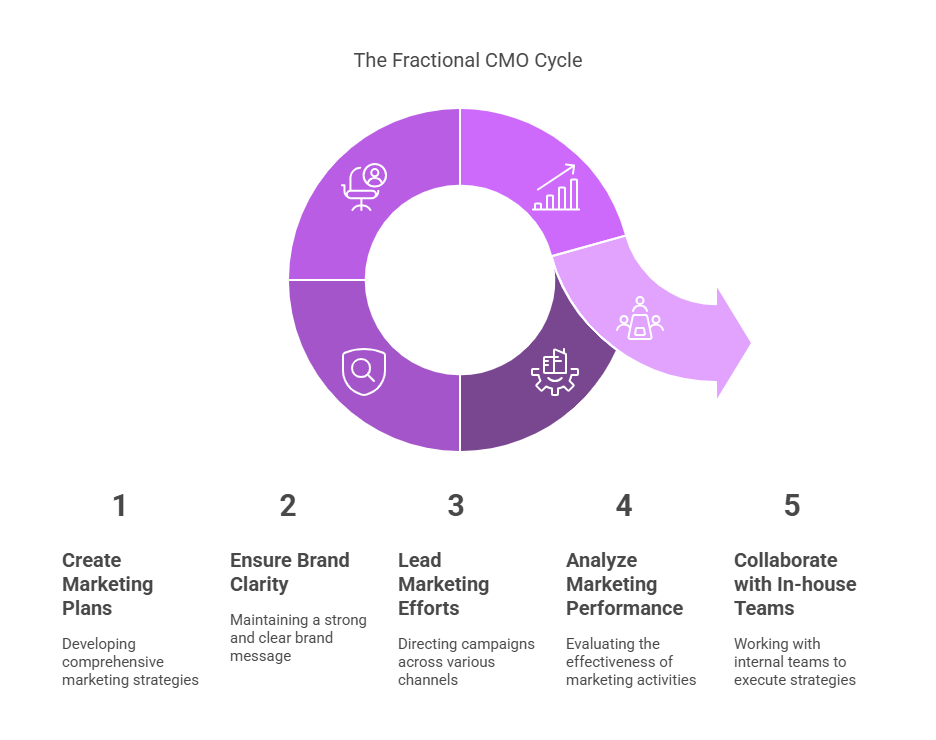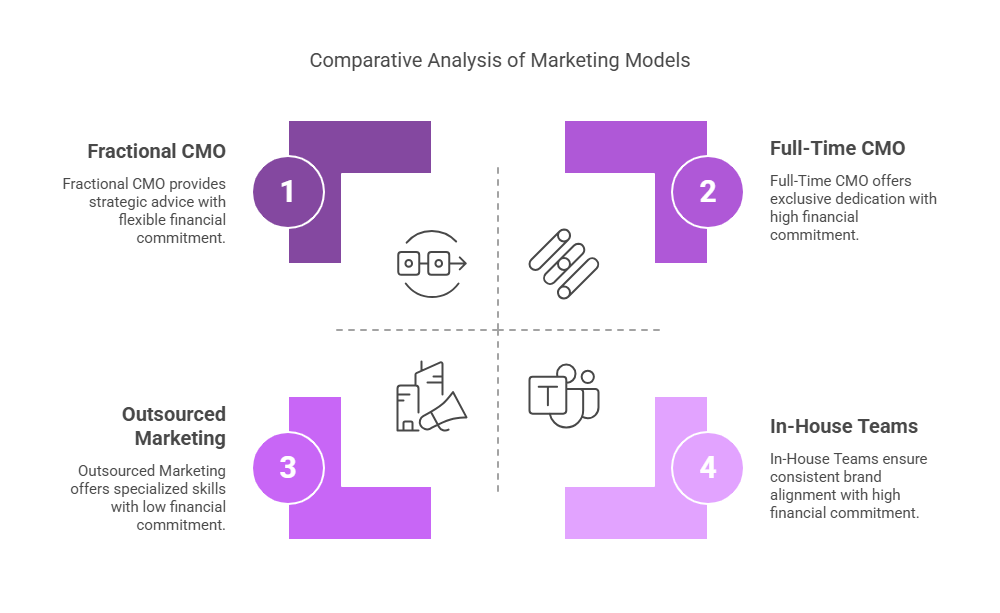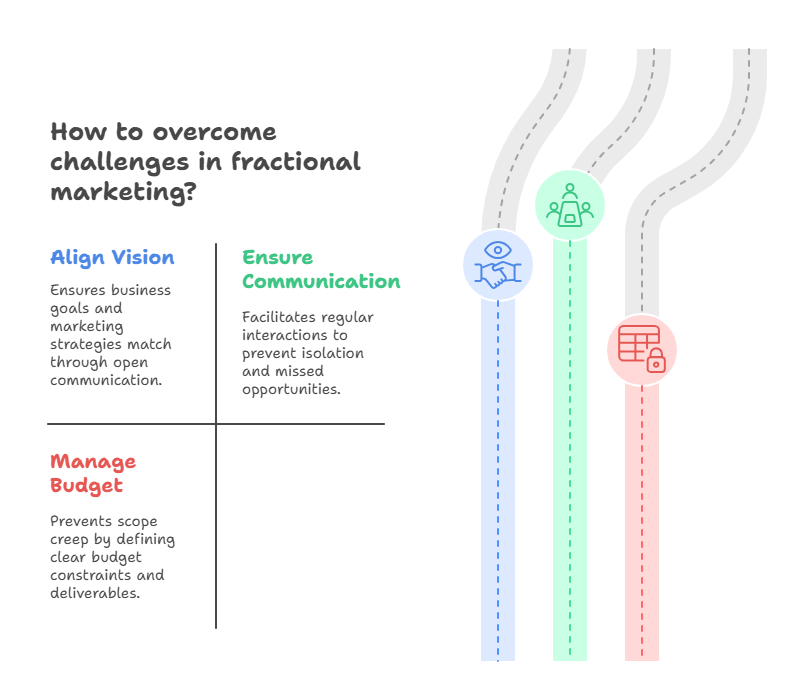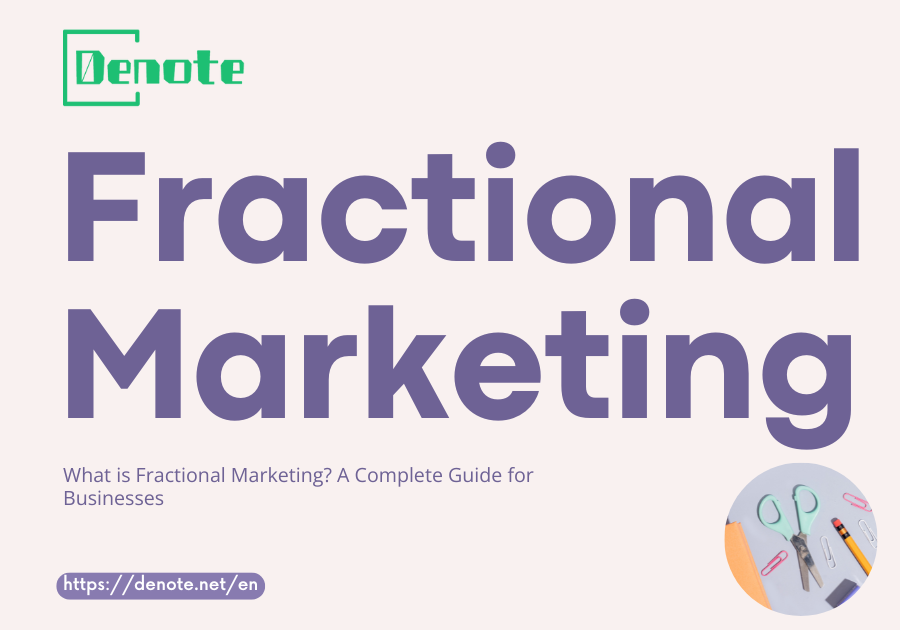What is Fractional Marketing
In today's fast-moving digital world, businesses need to be competitive with new marketing plans. But hiring a full-time Chief Marketing Officer (CMO) or a full marketing team can be hard for new and small businesses. Fractional marketing is a smart way to get high-level marketing help without hiring someone full-time. Companies can tap into expert advice from experienced CMOs or marketing teams on a part-time or project basis, avoiding high salary costs. This flexible approach allows businesses to grow, improve their marketing strategies, and achieve great results without spending too much money. It's an efficient and cost-effective method to compete in the ever-changing digital market.

How Fractional Marketing Works
Fractional marketing allows businesses to save costs by paying only for the specific marketing help they need. Instead of hiring a full-time Chief Marketing Officer (CMO) or building a whole marketing department, companies can hire skilled marketers on a part-time basis. These marketers work for multiple companies at the same time, offering flexible support. They specialize in planning high-level marketing strategies, managing their implementation, and boosting the company's growth. This approach allows businesses to benefit from expert marketing help without needing a long-term employment contract. Fractional marketing experts work closely with the company's in-house teams or collaborate with external agencies. This ensures that all marketing efforts are in line with the business's overall goals.
The Role of a Fractional CMO
A fractional CMO is a marketing expert who works part-time with companies. They help plan and guide marketing efforts without being a full-time employee. Their key tasks include:
- Creating in-depth marketing plans
- Ensuring the brand's message is clear and strong
- Leading marketing efforts across different channels like social media, email, and more
- Checking how well marketing efforts are working by analyzing data
- Working with in-house teams to implement successful marketing strategies
These professionals provide valuable advice and expertise. Businesses gain high-level marketing leadership without the cost and commitment of hiring a full-time executive.

How Businesses Utilize Fractional Marketing Services
Businesses, both large and small, use fractional marketing services in several practical ways:
- Strategic Consulting: They bring in a part-time Chief Marketing Officer (CMO) to develop important marketing plans and strategies.
- Campaign Execution: They partner with marketing experts to launch and run specific advertising campaigns effectively.
- Crisis Management: They depend on experienced marketers to guide them through branding challenges and manage their reputation during difficult periods.
- Digital Transformation: They employ digital marketing methods to strengthen their online presence and attract new customers and leads.
Benefits of Fractional Marketing
Cost-Effective Marketing Leadership
Hiring a full-time Chief Marketing Officer (CMO) can be very costly. It usually involves paying a high six-figure salary, along with benefits, bonuses, and other related expenses. Many startups and small to mid-sized businesses find this too costly to handle. An affordable solution is fractional marketing. This approach gives businesses access to top-level marketing leadership and expertise without having to pay for a full-time salary. Companies can get excellent strategic advice that fits their budget, ensuring every marketing dollar is spent effectively, instead of just hiring one person for the job.
Flexibility and Scalability
The big advantage of fractional marketing is its flexibility. Unlike hiring full-time staff, companies hire fractional marketing experts only when necessary. This could be for short projects, adjusting strategies, or providing ongoing marketing advice. Businesses can change their marketing efforts based on seasonal needs, budget restrictions, or new objectives. If a company needs leadership for a product launch, entering a new market, or managing a crisis, fractional marketing allows the company to adapt without long-term financial ties.
Access to Specialized Expertise
Marketing covers many areas, such as branding, content strategy, performance marketing, analytics, and growth hacking. Finding one person who can handle all these roles is both difficult and expensive. Fractional marketing allows businesses to access a network of experienced experts, each specializing in a specific area. This means businesses can use the latest strategies and industry best practices. They don't need to create an entire marketing team from scratch, saving time and resources while still achieving effective marketing results.
Faster Strategy Execution
In industries where things move fast, businesses must act quickly with their marketing efforts. Hiring and training a full-time CMO or marketing director can take many months, slowing down progress. But fractional marketing professionals, who can be brought in on a part-time basis, are ready to start immediately. They bring experience and strong planning skills, allowing them to quickly understand a company's needs. They can create a clear plan and implement solutions efficiently. This rapid way of working helps businesses stay ahead of the competition. It enables them to take advantage of new market opportunities and react swiftly to industry changes, keeping them on the cutting edge.
Enhanced ROI and Business Growth
Every marketing decision should help the business grow and increase profits. Experts in part-time marketing use data to guide their decisions, focusing on key numbers such as conversion rates, the cost of acquiring new customers, the return on money spent on ads (ROAS), and the overall return on investment (ROI) from marketing efforts. By constantly improving campaigns and ensuring marketing strategies align with business goals, these part-time marketers assist companies in achieving consistent growth. Their expertise in monitoring performance, experimenting with new channels, and enhancing messaging ensures that marketing budgets are used effectively to generate the best possible outcomes.

Who Needs Fractional Marketing
Startups and Small Businesses
Young companies often have limited budgets and resources, making it challenging to afford a full-time marketing team. However, successful marketing is very important because it helps spread the word about the company, attracts new customers, and increases income. A good solution for these companies is a fractional marketing approach. This allows startups and small businesses to receive expert advice and strategic guidance without the expense of hiring a full-time Chief Marketing Officer (CMO) or building an entire in-house team. This approach is cost-effective and allows businesses to compete effectively in the market while keeping their finances flexible.
Companies in Transition or Scaling Up
When a business grows quickly, changes its structure, or enters new markets, it can be hard to keep marketing consistent. Companies may face challenges when they launch new products, move into different areas, or have changes in leadership. Fractional marketing offers a solution by providing expert guidance to help manage these transitions smoothly. A fractional marketing leader helps ensure that the company's marketing stays aligned with business goals, maintaining momentum during crucial growth phases. This approach avoids the need for long-term hiring, offering flexibility without sacrificing effectiveness.
Businesses Lacking In-House Marketing Leadership
Many companies have skilled marketing teams, but they often miss senior-level direction. Without clear guidance, these teams can struggle to match their activities with the company's larger goals. A fractional CMO, or Chief Marketing Officer, offers the leadership needed to ensure marketing efforts deliver real results. By bringing in a seasoned professional on a part-time basis, businesses can refine their strategies, make the most of their marketing budgets, and boost overall performance—all without the expense of a full-time executive. This approach helps companies stay competitive and effective in their marketing efforts.
Fractional Marketing vs. Traditional Marketing Teams
Fractional CMO vs. Full-Time CMO
A fractional Chief Marketing Officer (CMO) works with various clients. They provide strategic advice only when needed. This role is different from a full-time CMO, who is employed by just one company all the time. There are some benefits to having a fractional CMO. It can save money because you pay them only for the time and expertise you need. They also offer flexibility and bring experience from working in different industries. This can be very helpful for companies that require high-level advice but can't afford a full-time executive. On the other hand, a full-time CMO is deeply involved with one company. Their main focus is to help that company grow. Hiring a full-time CMO requires a bigger financial commitment, as they are exclusively dedicated to the company they work for.
Outsourced Marketing vs. In-House Teams
Hiring outside agencies or freelancers for marketing tasks helps companies use special skills without spending a lot on a permanent team. However, these outside teams might not fully understand the brand, which can lead to differences in marketing messages and plans. On the other hand, having a marketing team inside the company keeps the brand’s message consistent, but they might not have all the skills for various marketing strategies. Fractional marketing is a good solution because it combines the guidance of experienced professionals with the assurance that marketing activities fit the company’s long-term goals, blending expertise with brand alignment effectively.
When to Choose Fractional Over Traditional Marketing
Fractional marketing is a smart and flexible choice in various situations:
- If a business needs a high-level marketing strategy but can't afford a full-time executive, this approach helps get the job done without breaking the bank.
- For companies looking to expand their marketing efforts efficiently, fractional marketing allows for growth while staying nimble and responsive to changes.
- When there's a need for specialized knowledge to fill gaps in an existing marketing team, fractional marketing introduces the necessary expertise to solve those challenges.
- If a company is experiencing rapid growth, going through restructuring, or entering new markets, but isn't ready to hire permanent staff, fractional marketing is an excellent method to bridge the gap.
Adopting fractional marketing enables businesses to craft strategies that are not only cost-effective but also scalable and focused on achieving real results. This method allows businesses to stay adaptable, ensuring they can adjust as needed while paving the way for long-term success.

How to Implement Fractional Marketing in Your Business
Identifying Your Marketing Needs
Before starting fractional marketing in your business, it's important to review your current marketing setup. Look for any gaps, like lacking strong leadership, facing issues with running campaigns, or missing knowledge in specific marketing channels. Are you struggling with planning content, managing paid ads, or understanding your competitors? By finding these issues, you can see where fractional marketing experts can be most helpful. Tools like Denote can assist businesses by showing what competitors are doing, tracking industry trends, and organizing marketing materials effectively. This helps to clearly identify where improvements are needed.

Choosing the Right Fractional Marketing Expert
A skilled fractional CMO can offer valuable knowledge and experience. Here’s what to look for in these professionals:
- Leadership and Strategic Thinking: They need to connect marketing efforts with the main goals of the business. This helps ensure all marketing activities support the overall direction of the company.
- Industry Knowledge: It’s important for them to understand market trends, customer behaviors, and what competitors are doing. This insight helps in making informed decisions.
- Multi-Channel Marketing Experience: Look for expertise in areas like paid advertisements, SEO, social media, email marketing, and developing content strategies. This variety ensures they can handle different marketing platforms and tools effectively.
- Data-Driven Decision-Making: They should be able to analyze marketing data to understand what’s working. By measuring the return on investment (ROI), they can make necessary adjustments to improve marketing campaigns. This approach helps in using resources more effectively to achieve better results.
Evaluating Experience and Industry Fit
Not every fractional marketer will be the right fit for all businesses. It's important to ensure the candidate’s experience fits your specific needs. If your company relies a lot on digital advertising, look for a marketer skilled in ad management and competitive analysis. They should be familiar with platforms like Denote to track competitor actions and how audiences engage with them. This expertise can be very beneficial. Likewise, if your focus is on brand positioning, find a marketer with a proven background in storytelling and content marketing. Their ability to develop a compelling brand story can significantly impact your business.
Setting Goals and Expectations
To ensure success in fractional marketing, it's important to have clear goals. Identify key things to monitor like the cost of getting new customers, the rate at which people buy after showing interest, how active and interested the audience is, and targets for increasing revenue. Setting expectations that can be achieved helps everyone involved to evaluate progress and make changes if necessary. Clearly outlining what needs to be accomplished, whether for a short-term project or ongoing advice, helps make sure that the business goals are in line with the marketing efforts.
Integrating Fractional Marketers with Your Team
Working well together is crucial when fractional marketers and in-house teams aim for smooth execution. It's important to communicate clearly, have organized workflows, and share access to marketing tools. Platforms like Denote help by simplifying the management of marketing materials, tracking competitor activities, and promoting knowledge sharing among teams. Denote offers a central place to store ad designs, campaign insights, and track performance. This setup ensures that fractional marketers can collaborate effectively with internal teams. By following these steps, businesses can successfully implement fractional marketing. This approach provides access to expert guidance and maintains flexibility while being cost-effective.
Common Challenges and How to Overcome Them
Aligning Vision and Expectations
In fractional marketing, one common challenge is making sure your business goals and marketing strategies match. If communication isn’t clear, there can be confusion about tasks, the audience you're targeting, and the main objectives. To avoid this, start with open communication. Clearly define what the project involves and what you want to achieve so your team and the fractional marketing expert are aligned.
Ensuring Effective Communication
Good communication is very important for success in marketing, particularly when you're working with external partners or companies. Without enough communication, teams can end up working in isolation, which can cause missed opportunities or duplicated work. To keep everything on track, it's essential to have regular meetings, honest reports, and clear communication methods. When you're looking at how a campaign is performing or figuring out ways to improve strategies, make sure everyone involved has a say in the decisions.
Managing Budget and Scope Creep
Another common challenge with fractional marketing is the potential for scope creep, where the original project parameters expand beyond what was agreed upon, often leading to budget overruns. To mitigate this, it’s crucial to define clear budget constraints, deliverables, and timelines upfront. Establishing a well-defined scope ensures that all parties understand the expectations and can work within the agreed-upon framework. Regular reviews and adjustments to the plan can help prevent unexpected costs.

Future of Fractional Marketing
As companies aim to be more flexible and save money, fractional marketing is becoming a go-to option. Businesses recognize the perks of having skilled marketing leaders without bearing the expense of full-time executives. This trend is likely to grow as marketing leans more towards using data and achieving solid results.
The introduction of AI tools adds to the attractiveness of fractional marketing. It helps by analyzing competitors, optimizing campaigns, and managing marketing materials. It offers deeper insights into what competitors are up to and current industry patterns. With this information, fractional marketers can make better decisions and create campaigns that are more targeted, which leads to better returns and quicker action. Using tools like Denote can enhance the impact of fractional marketing and help businesses stay competitive in the fast-changing market.
Conclusion
Fractional marketing is a great way for businesses to get expert marketing help without spending too much money. It helps solve common problems such as keeping everyone aligned, ensuring clear communication, and handling budgets effectively. By using AI-powered tools like Denote, companies can fully tap into the benefits of fractional marketing. This approach can help businesses grow and stay competitive in their industry.
.jpg)
